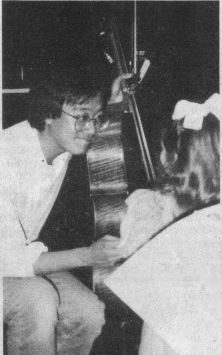
For the Kentucky Cello Club and a handful of young student-musicians, Yo-Yo Ma's return to Louisville for a performance with the Louisville Orchestra on September 15th resulted in much more than just an opportunity to hear one of the world's finest musicians. Following the dress rehearsal with the Louisville Orchestra, the cello club members were scheduled to have a few brief moments with this famous cellist.
Immediately upon his appearance for the rehearsal on the stage of Whitney Hall in the Kentucky Center for the Arts, Ma bowed to the orchestra members and conductor Lawrence Leighton-Smith, then began waving to the children in the audience. It is this sort of action that sets Ma apart from many musicians and has given him a deserved reputation as a warm and sensitive performer. As he enveloped himself in the music, his audience was captivated by his skill, his facial expressions, and his poignant and romantic interpretation of Dvorak's Cello Concerto, Op 104.

As soon as the rehearsal with the orchestra ended, Ma invited all the cello club members to come onto the stage with him. Dressed in blue jeans, tennis shoes, and a white shirt with rolled-up sleeves, his friendly and casual demeanor helped everyone around him to relax. Although it is unusual for famous personalities to be open about themselves, Ma encouraged personal and professional questions. Below are some of the questions and a summary of his answers.
How does he prepare for a performance?
Aside from the obvious answer of learning the music well, he feels that it is important to reflect on why the audience came. The most important preparation, however, is to know as much about the composer and what he or she intended to convey emotionally with the music.
How does he manage to turn "on" and "off" these emotions before and after a concert?
This, he admits, has been a very difficult and exhausting part of performance, but it is one to which he has learned to adapt. As a younger performer, he experienced the feeling of "That's it?" after completing a piece of music. Now he has learned to gauge himself and his emotions while he is playing so that this is no longer a big problem for him.
When did he begin studying the cello?
Ma lived in France as a child and began studying the violin at the age of three. Because he had an older sister who played the violin quite well, he was thought not to have much talent for music when he didn't play as well as she. When his father suggested changing the instrument to something else, Ma chose the double-bass. For a child of four years, this was a bit large, and so they compromised with the cello.
Under what teachers did he study?
His best teachers, he says, were the ones who encouraged him to ask the question "Why?" Curiosity leads to creativity and a greater understanding of one's self. He had several teachers in France, and after coming to the United States, Ma studied under Leonard Rose. Having good teachers, as he did, was a great factor in his success as a musician.
What advice does he have for parents of young musicians?
As a parent of two children himself, he believes that any practice is better than none, and this can be as little as a few minutes of experimentation with the instrument. It is not so important always to have a structured lesson. Get children good teachers, and remember that as parents, our expectations are almost always too high for our children. He believes it is crucial not to push them too hard or to rush them through music.
The time with Ma went much too quickly for the Kentucky Cello Club that day. The more one knows about this virtuoso, the more one wants to know. Certainly, all of the people on the stage with him will never forget his warmth and graciousness, as well as his beautiful cello performance with the Louisville Orchestra.